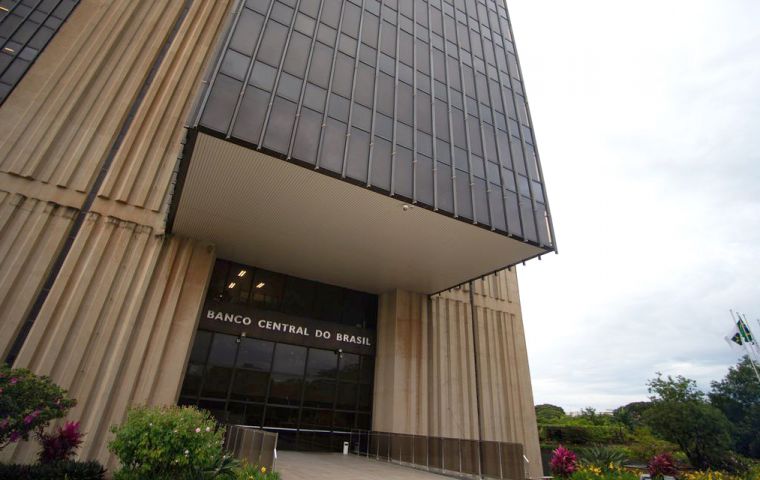MercoPress. South Atlantic News Agency
Brazil's Central Bank ups basic interest rate to curb growing inflation
 The Selic recorded an all time high in July 2015, when it reached 14.25%
The Selic recorded an all time high in July 2015, when it reached 14.25% In a move to curb growing inflation, Brazil's Central Bank Wednesday decided to raise the basic interest rate by 0.75 percentage points, to 3.5% per year. It was the second time in a row that the monetary authorities responded to this type of measure.
The Central Bank's Monetary Policy Committee (Copom) unanimously agreed to raise the so-called Selic rate from 2.75% to 3.5% amid mounting inflationary pressure.
Interest rated had been upped in March for the first time in six years, from 2% to 2.75%, despite the economic crisis and the uncertainty generated by the coronavirus pandemic.
The increase in interest seeks to curb the increase in the price index. In the last 12 months, inflation stood at 6.10%, way above the 3.75% (plus / minus 1.5%) goal set for the year 2021.
The Central Bank pointed out in a statement that, except for oil, international prices of raw materials continue to rise, with an impact on the projections of prices for food and industrial goods. “The Committee maintains the diagnosis that the current shocks are temporary, but remains attentive to their evolution,” the monetary authority said.
Looking ahead to the next meeting, the Committee predicted the “continuation of the process of partial normalization of the stimulus with another adjustment of the same magnitude.”
The market expects the interest rate to end the year at 5.5% and 6.25% in 2022, according to the latest bulletin released this week by the Central Bank and which gathers the opinion of a hundred experts.
The Selic recorded an all-time high in July 2015, when it reached 14.25% and remained at that level until mid-2016, at which point the Central Bank began a sustained decline to the historic low of 2%.
With the gradual increase, the Central Bank seeks to curb inflation, but it must also prevent the rise in rates from interfering in the country's economic recovery after the strong hit in 2020.
Brazil's GDP fell by 4.1% last year, the worst annual result since 1996, and by 2021, according to economists consulted by the Central Bank, it will grow by 3.14%.
“Concerning the Brazilian economic activity, recent indicators show a more positive evolution than expected, despite the intensity of the second wave of the pandemic being greater than expected,” the Central Bank report read. It also specified that the uncertainty about the growth of the economy remains above the usual, “but after a while, it should return to normal.”




Top Comments
Disclaimer & comment rulesCommenting for this story is now closed.
If you have a Facebook account, become a fan and comment on our Facebook Page!